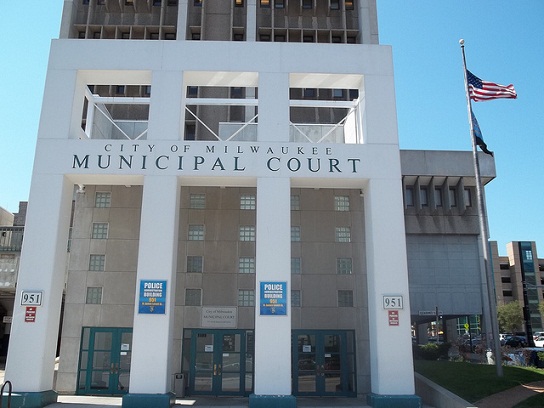Milwaukee Municipal Court Under Fire
It imprisons debtors and seems bloated with staff. Will city demand changes?
This is a story about poverty and how the city is handling it. The story centers around the Milwaukee Municipal Court, which has created a kind of debtor’s prison that has imprisoned the mostly poor and minority offenders who owe various fines. But the court, you see, is a money maker for the city. So how will the Common Council and the mayor handle this ugly situation?
The story begins with the police, because many of those fines are owed for tickets issued by them. Yet the interesting thing is that the police are actually writing far fewer tickets than just five years ago. That’s quite a surprise, because the police have actually greatly increased the number of traffic stops they make.
When Ed Flynn took over as police chief in Milwaukee in 2007, officers were making just under 53,000 traffic stops per year; that’s risen to more than 185,000 per year in the last three years. Police did less than 15,000 field interviews in 2007; that’s risen to more than 58,000 annually over the last three years, as I’ve reported.
These traffic stops and interviews are part of a pro-active, data-oriented approach that concentrates on crime-ridden neighborhoods and hot spots. But these are also areas with high concentrations of African American and Latino residents, that could become victimized in the process.
“We knew if we weren’t careful,” Flynn once told me, “that we would be imposing a poor people tax because a high-crime neighborhood is a poor neighborhood.” So officers were urged early on in the process to avoid criminalizing minor offenses. “The preferred outcome of a traffic stop is a warning,” Flynn noted. “80 percent of our stops are warnings.”
As a result of that approach, something remarkable has happened. Despite the huge increase in people stopped by the police, tickets issued dropped from just under 110,000 in 2008 to 48,359 in 2014. The result, however, had an unexpected effect on the Milwaukee’s Municipal Court: less tickets has meant less business for the court, as the number of cases dropped from around 158,000 to 79,000 during this period.
The Milwaukee Journal Sentinel recently did a story on the resulting impact on the municipal court. Former Milwaukee municipal court judge Jim Gramling questioned whether the court should be spending $40,000 a year on five commissioners.”They shouldn’t even be spending city money on the court commissioners,” he told the newspaper.
Ald. Terry Witkowski, chair of the Common Council’s Public Safety Committee, suggested that three municipal court judges may not be needed given the decline in cases. “It’s about time to shake down whether we need the staffing that we have,” he told the paper.
The total budget for the municipal court was $3.6 million in 2008 and its adopted budget for 2014 was $3.4 million, a tiny decrease even as the cases have plummeted by 50 percent. “I was asking questions about this during the last budget cycle from chief (municipal court) judge Philip Chavez and I couldn’t get an answer from him,” Witkowski tells me. “Not only was I incensed but so were most members of the committee.”
But beyond the issue of the budget, the municipal court has also been criticized for its style of justice. A recent study by the UW-Milwaukee Employment and Training Institute (ETI), and released by the Justice Initiatives Institute, provided a damning picture of a court that seems to have created a debtor’s prison. The study found the court has imprisoned thousands of individuals, 78 percent of them African American, for a failure to pay municipal fines. Worse, the study found the court actually loses millions of dollars for taxpayers, because the cost of the imprisonment in county jail far outstrips the money gained from all the fines paid. I reported on the study back in April.
On Sunday the JS did another story, which focused on another question raised by ETI’s research: why have driver’s license suspensions “become one of Milwaukee’s most widely used debt collection mechanisms for unpaid traffic fines, with municipal court issuing almost 48,000 suspensions for that reason in 2014 alone,” as the story put it. The result is that many city residents, who are predominantly African American, lose their driver’s license and the ability to get to any jobs located in suburban or exurban locations not served by the Milwaukee County bus system.
The huge importance of a driver’s license for job seekers was demonstrated by an earlier ETI study which found that women who had not graduated from high school but had a valid driver’s license were more likely to be employed than women who had graduated from high school but did not have a license.
The Justice Initiatives Institute and ETI researcher John Pawasarat have questioned why the municipal court is jailing people and suspending their licenses in order to collect fines. Under state law, judges must ask people who appear in traffic court if they are financially able to cover the fine; if not, the court is supposed to give them more time to pay, develop a payment plan or issue a requirement that they do community service.
Witkowski tells me he is further incensed by the court’s unwillingness to use community service and avoid using jail time and license suspensions to enforce the collection of fines. “This is extremely important. I will schedule a meeting in September. If they (judges) continue to be non-responsive I would consider legislation that would abolish and then recreate municipal court.” Since the judges are elected, he notes, the city can’t fire them, but they can abolish the court and start over.
But looming over all this is the issue of revenue. While it costs more to jail people than the fines that are collected from them, that includes the cost of imprisonment for the Milwaukee County Jail. But for the city, which isn’t charged by the county jail, the municipal court has typically been a net revenue generator, gaining the city $2.9 million in 2010, a figure which dropped to $2.1 million in 2013, the most recent data from the city’s Legislative Reference Bureau shows. That may have declined further as tickets issued by police have continued to decline, and certainly suggests reason to cut the court’s staff. But as to the issue of judges requiring community service for those who can’t pay fees, will the Common Council worry this might lower revenue generated by the court?
Pawasarat suggests the issue may have a simple solution. He points to the state’s Tax Refund Interception Program or TRIP, by which the Wisconsin Department of Revenue collects monies owed to government agencies. TRIP intercepts state income tax refunds (tax withholdings and refundable tax credits) for those with outstanding parking tickets or unpaid municipal citations and forwards that intercepted money to the local government or its collection agents.
In the last three fiscal years, Pawasarat notes, the Department of Revenue reported TRIP collections of $6.9 million for the Milwaukee Municipal Court and another $6.9 million for DPW parking enforcement fines and charges.
“Since the TRIP program effectively captures the income of employee residents, why take away low-income residents’ driver’s licenses for two years,” he asks “Why make it impossible for low-income residents with parking fund debts to register (or sell) their vehicle(s) or to legally drive their car?”
As for those who lack a job, why remove their best way to get a job — having a driver’s license? And why add imprisonment as a punishment? In those cases, why not use community service as an option?
Surely the city should be doing all it can to reduce the burden on its poor citizens and do all it can to help them get jobs. Witkowski intends to take up the issue of municipal court in September. Will Mayor Tom Barrett and the Common Council move to eliminate Milwaukee’s version of a debtor’s prison? Let’s hope so.
If you think stories like this are important, become a member of Urban Milwaukee and help support real, independent journalism. Plus you get some cool added benefits.
Political Contributions Tracker
Displaying political contributions between people mentioned in this story. Learn more.
- March 31, 2018 - Tom Barrett received $400 from James A. Gramling, Jr.
- June 7, 2017 - Tom Barrett received $400 from James A. Gramling, Jr.
- March 21, 2016 - Terry Witkowski received $100 from James A. Gramling, Jr.
- March 11, 2016 - Tom Barrett received $400 from James A. Gramling, Jr.
- December 31, 2015 - Terry Witkowski received $100 from James A. Gramling, Jr.
- September 3, 2015 - Terry Witkowski received $100 from James A. Gramling, Jr.
Murphy's Law
-
Top Health Care Exec Paid $25.7 Million
 Dec 16th, 2025 by Bruce Murphy
Dec 16th, 2025 by Bruce Murphy
-
Milwaukee Mayor’s Power in Decline?
 Dec 10th, 2025 by Bruce Murphy
Dec 10th, 2025 by Bruce Murphy
-
Total Cost of Foxconn Is Rising
 Dec 8th, 2025 by Bruce Murphy
Dec 8th, 2025 by Bruce Murphy























I never heard of the TRIP program. Even though I believe people should be held accountable for laws they break and fines they accrue, it is clear many people simple don’t care about consequences. The trip program is a perfect way to get what’s owed without worrying about what a person may or may not think about jail or license revocation.
Under Wisconsin’s voter ID law, is a suspended drivers license valid for voting, or is this court also taking away residents’ right to vote?
No, it would have no effect.
This seems to be happening in a lot of places, not just Milwaukee. In so many instances the punishment doesn’t fit the crime and people are punished for being poor and not much else. I suggest reading the current issue of the New York Times Magazine. It’s a depressing look at the bail system there and how completely broken it is. A construction worker got arrested for having a straw inside of a soda can. The arresting officer said straws are commonly associated with heroin (no drugs were found on the man; he had just purchased the soda at a convenience store). He couldn’t afford bail and ended up at Riker’s Island. Over a straw. It just boggles the mind. Naysayers keep pointing out that some people don’t care about consequences. Fine, that’s true. But tons of people are being screwed by the system. What about them? Or don’t you care?
Yeah, cases like that are pretty few and far between… you can’t make everyone into a victim.
Actually they are not AG, especially in places like NYC. And no one is saying everyone is a victim. Compassionate conservative you are not.
PMD, this isn’t NYC. The median Jail time (and ANY jail time is pretty darn rare for how many cases there are) is 3 days and those are only while they are held for a court appears because they are ridiculously past due and have missed multiple court dates. Once there, community service is an option along with a few other choices for people who can’t afford fines. As far as I’m aware, judges have always been fair in helping people who do not have the means to pay fines. The main problem is that people have to actually show up in court to get the assistance. Bruce’s story here is the first I’ve heard of the court avoiding community service or other options for people who couldn’t afford it.
I’m not as cold as you’re making it out, I just think the issue is being way over blown and a MUCH bigger issue is people taking responsibility for their actions.
Bruce, in an unrelated comment, Chance the Gardener is becoming Leonard Zelig. Watch for the combover.
Sounds pretty easy, don’t get tickets and if you do, show up to court and work out a payment plan